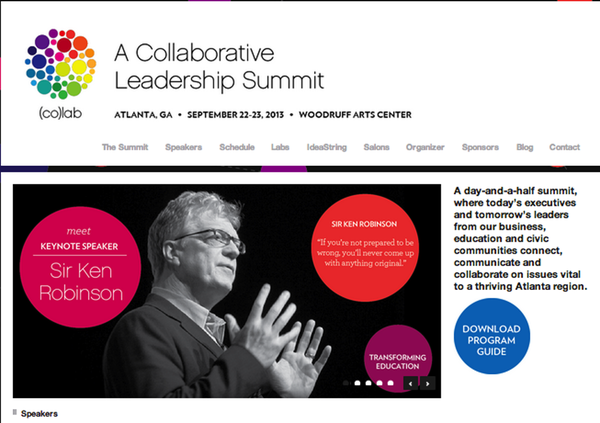On Sunday and Monday, Leadership Atlanta hosted the first (co)lab event… pitched as a “Collaborative Leadership Summit” that would help Atlanta connect, communicate, and collaborate on issues vital to Atlanta. It was a very well-produced event, with extraordinary speakers. If you weren’t there, I recommend you peruse the Twitter stream (hashtag #colab13) and watch the videos that are being uploaded on the YouTube channel. Thomas Friedman’s keynote is already up, and is well worth watching. Other talks and panels are just as good, and will appear over the next few weeks.
The question now is… what comes next?
I wrote this for a small list of friends as feedback on the conference, and I’ve received enough positive comments that I decided to publish it for everyone to see. I hope everyone realizes that, although some of it is criticism, it’s intended to be constructive criticism.
Connect. Communicate. Collaborate.
I think (co)lab 13 accomplished that. And it’s a great start on what I hope will be an annual event.
So, how do we make it better?
I think there are some “co-” words that we didn’t use… and we should.
Contrast. Confrontation. Controversy. Coexist.
I loved most of the speakers, but a lot of them were preaching to the choir… and the twitterstream and the lobby conversations mostly sounded like a echo chamber.
Look, some of the issues we’re focusing on are controversial! But you never would have guessed that from Sunday and Monday. I tried to highlight this in one of my three readout slides at the end of the conference: there are five million Atlantans who like sprawl and like suburbs. Let’s not demonize them with speakers talking about “The End of Suburbs.”
Or, at least, teach the controversy. Equal time for the other side. Embrace the contrast.
You know what I’d love to see? A two-person panel: Kevin Green (Midtown Alliance) and David Belle Isle (mayor of Alpharetta). Both passionate, both smart, both comfortable on stage. Put a neutral moderator in between them and let them debate Suburbs versus New Urbanism for a solid hour. I bet they can confront each other without being confrontational. And we might actually find some common ground that surprises us.
Competition. Collisions. Counterpoints. Compromise. Consensus.
We can’t afford to do everything; projects have to compete for resources. And some priorities collide with other priorities. Okay, so everyone in the room gave Susan Booth a standing ovation. She was spectacular. But why aren’t we teaching more arts in the schools? Not enough time? Not enough money? Not enough classrooms? Not enough teachers? Too many tests on other subjects? Too much football? Parents don’t care? All those are legitimate counterpoints, but we just put “Yay, art!” out there in a vacuum and demonized anyone who dared to say “Hmm, not so fast…”
Again, let’s get the competing ideas out there, and understand the tradeoffs. “If this, then not that.” We’re grownups, and we deal with tradeoffs constantly in our day jobs. Help us understand the tradeoffs in areas that we’re NOT so familiar with. And then navigate to compromises that can generate a rough consensus towards action.
Contribute. Comments.
Except for the salons on Sunday night, the “collaborative leadership summit” consisted of a thousand or so people sitting and being lectured at. The lectures were great, but there was darn little collaboration.
I know, it’s not practical to break 1400 people into small groups during the conference. The IdeaString site is a good start on collaborating, but we launched it too late. And the Twitter feed would be a great real-time resource, except that the Woodruff’s Wi-Fi and cellular connectivity were terrible. (And it would require dedicated individuals to monitor for each track, and feed ideas to the stage in realtime.)
Next year, let’s have the IdeaString topics available for comment a month before the conference, and have a couple of rounds of very visible down-selection to the handful of winners.
During the presentations themselves… let us vote! Think of the “Colored Dots” exercise, where every audience member gets a certain number of dots to stick on posters. It’s a great way to establish rough consensus about which solutions gather the broadest support. But you can’t do it for 1400 people. So, digitize that! Let all 1400 attendees vote with their cellphones at the end of each panel. Put ideas up on the screen and let the audience prioritize. Rely on the wisdom of the crowd.
Comfort. Convenient.
Minor stuff, mentioned above. Fix the Wi-Fi. Fix the cell signals. Figure out a way to feed people efficiently, and give them a place to sit. Etc. etc. Maybe that means a new venue, maybe not.
And, finally, the “co-” words to avoid:
Complacency. Condescension. Contempt.
I know that I don’t have all the answers, and I’m willing to learn from anyone. Declaring someone’s position to be “immoral” in the Twitter stream doesn’t help communicate, nor build consensus. Let’s make open hearts and open minds a shared value for all the presenters and moderators, and hope that it spreads to the participants!
I hope these thoughts are useful… I really enjoyed my time preparing for (co)lab and my time at the event itself. I certainly tweeted enough! I just want to make sure that, next year, we don’t wind up doing the exact same thing and wondering why nothing changes.

For those people who want to take all these great ideas generated & discussed at (co)lab Summit (and the TEDxCity2.0), we invited them to take part in the Core Reaction on October 17-18.
We’re seeking 100 Atlantans from diverse perspectives, areas of expertise, and neighborhoods to help answer the question “How would you like to see Atlanta thrive, play, and grow in the next five years?”
More details here: http://www.hypepotamus.com/core-reaction-resolution-details/